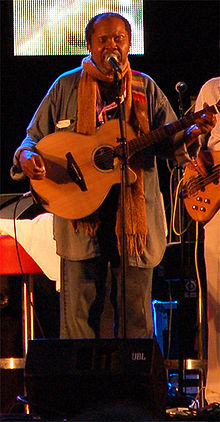Terry Callier
| Terry Callier | |
|---|---|
 |
|
| Background information | |
| Birth name | Terrence Orlando Callier |
| Born |
May 24, 1945 Chicago, Illinois, United States |
| Died | October 27, 2012 (aged 67) Chicago, United States |
| Genres | Folk, jazz, soul |
| Occupation(s) | Singer-songwriter, computer programmer |
| Instruments | Vocals, guitar, piano |
| Years active | 1962–1983, 1991–2012 |
Terrence Orlando "Terry" Callier (May 24, 1945 – October 27, 2012), was an American jazz, soul and folk guitarist and singer-songwriter.
Callier was born in the North Side of Chicago, Illinois, and was raised in the Cabrini–Green housing area. He learned piano, was a childhood friend of Curtis Mayfield, Major Lance and Jerry Butler, and began singing in doo-wop groups in his teens. In 1962 he took an audition at Chess Records, where he recorded his debut single, "Look at Me Now". At the same time as attending college, he then began performing in folk clubs and coffee houses in Chicago, becoming strongly influenced by the music of John Coltrane. He met Samuel Charters of Prestige Records in 1964, and the following year they recorded his debut album. Charters then took the tapes away with him into the Mexican desert, and the album was eventually released in 1968 as The New Folk Sound of Terry Callier. Two of Callier's songs, "Spin, Spin, Spin" and "It's About Time", were recorded by the psychedelic rock band H. P. Lovecraft in 1968, as part of their H. P. Lovecraft II album. H. P. Lovecraft featured fellow Chicago folk club stalwart George Edwards, who would go on to co-produce several tracks for Callier in 1969.
He continued to perform in Chicago, and in 1970 joined the Chicago Songwriters Workshop set up by Jerry Butler. He and partner Larry Wade wrote material for Chess and its subsidiary Cadet label, including The Dells' 1972 hit "The Love We Had Stays on My Mind", as a result of which he was awarded his own recording contract with Cadet as a singer-songwriter. Three critically acclaimed but commercially unsuccessful albums followed, produced by Charles Stepney: Occasional Rain (1972), What Color Is Love (1972), and I Just Can't Help Myself (1974). These demonstrated that Callier's influences included R&B, soul and jazz. Subsequently he toured with George Benson, Gil Scott-Heron and others. Cadet and its parent label Chess were sold in 1976 and Callier was then dropped from the label. The Songwriters Workshop closed in 1976. The following year, he signed a new contract with Elektra Records, releasing the albums Fire On Ice (1977) and Turn You to Love (1978). The opening track of the latter album, "Sign Of The Times", was used as the theme tune of radio DJ Frankie Crocker and became Callier's only US chart success, reaching # 78 on the R&B chart in 1979 and prompting his appearance at the Montreux Jazz Festival.
...
Wikipedia
